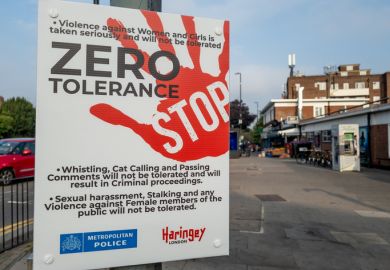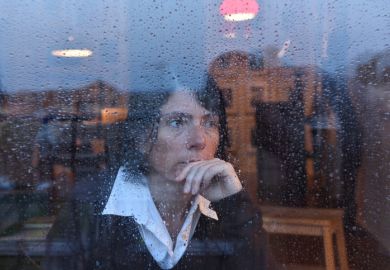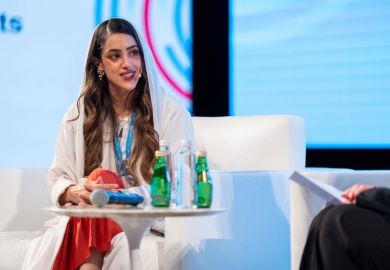Source: Getty
Close scrutiny: new data published by Research Councils UK reveal that, in science, women do not apply for grants and fellowships at the same rate as men
The success of female scientists at securing research funding has never been under closer scrutiny. Earlier this year, the Royal Society published the results of a detailed investigation into why so few women managed to get their 2014 University Research Fellowships.
Now, as reported in Times Higher Education this week, Research Councils UK has published data for the first time on female success rates for each specific research council’s grants and fellowships.
What is emerging is a new understanding of why so few women manage to get ahead in science: they simply do not apply for research grants and fellowships at the same rate as men.
Uta Frith, emeritus professor of cognitive development at University College London and fellow of the Royal Society, said that February’s report into why just two of the 43 Royal Society fellowships went to women was a “galvanising point”.
The society’s report found that just 23 per cent of all the URF applications came from women, and female scientists ended up with less than 5 per cent of the fellowships.
Professor Frith said that the report meant that “we became really aware for the first time” that the female success rate was related to the poor female application rate. “We all believed that the success rate was the thing to worry about…it turned out not to be true and it was a bit of a shock,” she said.
Turning the spotlight on to the application rate is “an important step forward in the whole discussion”, said Professor Frith, who will chair a new diversity committee at the Royal Society from June.
For the first time the committee will collaborate with other institutions, such as the Wellcome Trust and the research councils, she said. “There is an amazing willingness [to look at the issues] everywhere…a real kind of momentum has been created,” she added.
Professor Frith said that the committee will propose to broaden the data collated as part of the URF investigation to include information on the application and success rates by gender for career development fellowships from all funders. Armed with these data, she wants to do an empirical analysis of what has happened over the past five years and why, rather than just relying on opinion. “We have to go and find out what women and men actually want when they are at different stages of their careers. Is it the case [that] what is on offer is just no match?” she asked.
Unconscious bias and free nannies
Female application rates are also on the agenda at the Biotechnology and Biological Sciences Research Council. At a recent event about women in science at the Wellcome Trust, Jackie Hunter, BBSRC’s chief executive, said that funders should be “keeping score” on the issue and holding people to account.
“When I came into the BBSRC, I asked to have an assessment of all the grant proposals that we got,” she said. “Over the past three years to 2013, 20 per cent of our applications were from women, pretty consistently,” she said. This is despite data from the Higher Education Statistics Agency showing that about a third of all academics in the biological sciences are female.
Professor Hunter said that every year the council sends out letters about grant success rates to institutions that they fund. The latest round of letters included data on application and success rates by gender. During visits to universities, Professor Hunter said that she talks to institutions about whether their application rate is reflective of their eligible numbers of female principal investigators. “If we don’t [get people to] apply, then we aren’t going to get people getting grants, and if [they] don’t get grants we don’t get people promoted,” she said at the Wellcome event on 5 March.
The BBSRC is going to work with the eight universities that have the biggest discrepancy between application rates and the eligible population to find out the “root cause” of the problem, she said.
The Engineering and Physical Sciences Research Council is also considering taking some “bold measures” on diversity. Alison Wall, associate director at the council, told Times Higher Education that they are not yet sure what these will be, but that a dialogue will begin over the summer.
Currently, the EPSRC is working towards a 30 per cent target for female representation on its peer review panels, strategic advisory team, strategic advisory network and council, and in its peer review college over the next three or four years.
Ms Wall admits that this will be harder in some areas than others, notably peer reviewers, because only 13 per cent of academics in the engineering and physical sciences are female. But she adds that the EPSRC is keen to make progress. “It does feel like it is time to put some more challenging targets in place,” she said.
The EPSRC will also break down gender success and application rate data by research theme and university, the better to understand where to target action and work with universities.
At the Medical Research Council, Jim Smith, deputy chief executive and director of the MRC National Institute for Medical Research, told delegates at the Wellcome Trust event that several measures have been put in place to tackle wider issues.
One is unconscious bias training, which is being rolled out across the MRC’s institutes and grants office. Dr Smith has undertaken the training and said that he was “shocked” at the outcome.
“We need to be terribly aware when we sit on panels, and when we review, that we are not trying to hire people just like [ourselves], because otherwise we are just going to be maintaining the status quo forever,” he said at the event.
The MRC has also signed up to an organisation called My Family Care, which offers short-notice childcare. Dr Smith said: “We all know that science is an activity where sometimes you have to get into the lab at 7am in the morning or go to a meeting. If you have children, this can make life very difficult.” To help to mitigate these problems, MRC staff now have access to this childcare service and the first two sessions are free.
Earlier this month, the MRC also became the first council to lift the limit on the number of years after a PhD that researchers can apply for fellowships. It is hoped that this measure will allow for more varied career paths while recognising that the speed of career progression can be affected by factors outside ability.
Professor Frith said that steps such as these are exactly the kind of changes that are needed to help women in science.
Universities and applicants need to do their bit, too, she argued. “It is not just a matter of changing the grant application procedure,” she added.
Register to continue
Why register?
- Registration is free and only takes a moment
- Once registered, you can read 3 articles a month
- Sign up for our newsletter
Subscribe
Or subscribe for unlimited access to:
- Unlimited access to news, views, insights & reviews
- Digital editions
- Digital access to THE’s university and college rankings analysis
Already registered or a current subscriber?





